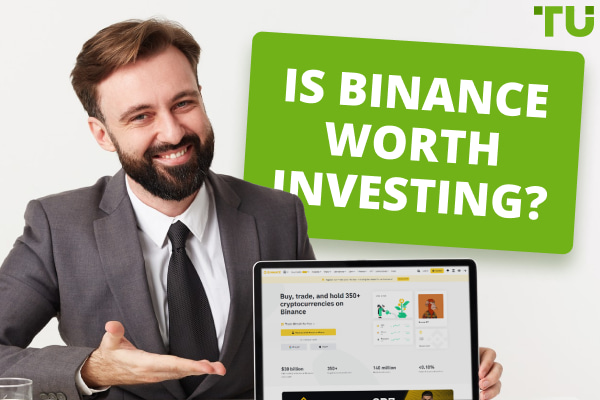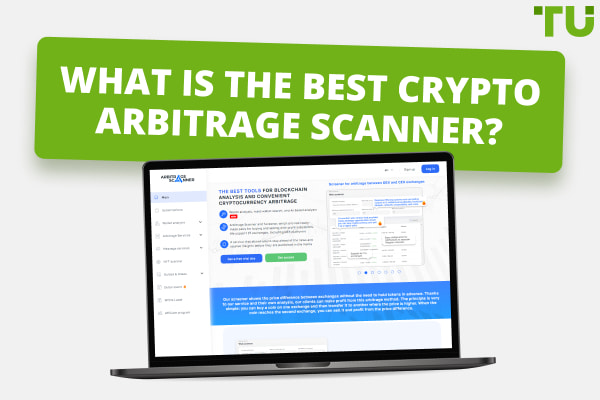Best Non-KYC Crypto Exchanges in 2024

Best Non-KYC Crypto Exchanges in 2024 - Binance
According to TU analysts, the top non-KYC cryptocurrency exchanges in 2024 are:
Binance - Daily withdrawal limit is set at 0.06 BTC without full KYC
Huobi Global (HTX) - Daily withdrawal limit of 0.06 BTC and a $1,000 deposit limit.
StormGain - There are no limits or restrictions for trading without KYC
MEXC - Daily withdrawal limit is 30 BTC
Yobit - No limits or restrictions for trading without KYC
CoinEx - Daily transaction limit of $10,000
Phemex - Daily withdrawal limit of $50,000
Every year, the number of reliable and secure no-KYC exchanges decreases as tax offices and other government agencies crack down on cryptocurrency exchanges by requiring them to gather personal data and adhere to legal requirements. Experts from TU have compiled a list of the top non-KYC cryptocurrency exchanges for 2024 in this article.
-
Is there a crypto exchange without KYC?
Yes, there are crypto exchanges that operate without requiring KYC verification. These exchanges allow users to trade cryptocurrencies without submitting personal identification documents. Some notable exams are Huobi Global, StormGain, MEXC, Yobit, CoinEx, and Phemex.
-
How to choose the best crypto exchange without KYC?
Selecting the best no-KYC crypto exchange involves assessing factors like reputation, security, supported cryptocurrencies, fees, user interface, active customer support, and regulatory compliance. TU experts recommend a reputable exchange with strong security measures, diverse coin support, and user-friendly features.
-
What are the advantages of using a crypto exchange without KYC?
Using a no-KYC exchange offers advantages such as enhanced anonymity, faster trading processes, increased accessibility for users facing regulatory challenges, and greater financial freedom.
-
Why is it unprofitable to use crypto exchanges without KYC?
No-KYC exchanges offer privacy, but they might also be less functional, more risky because of possible illegal activity, operate in an unclear regulatory environment, and suffer from a lack of trust.
No KYC crypto exchanges Rating - top no KYC exchanges comparison
The best no-KYC cryptocurrency exchanges (spot) as identified by TU analysts are listed in the table below.
| Exchange | Max. Maker Fee | Min. Maker Fee | Max. Taker Fees | Min. Taker Fee |
|---|---|---|---|---|
|
0.1% |
0.02% |
0.1% |
0.04% |
|
|
Huobi Global (HTX) |
0.2% |
0.0126% |
0.2% |
0.0218% |
|
0.4% |
0.4% |
0.4% |
0.4% |
|
|
0.1% |
0.05% |
0.1% |
0.05% |
|
|
0.2% |
0.2% |
0.2% |
0.2% |
|
|
0.2% |
0.2% |
0.2% |
0.2% |
|
|
0.1% |
0.09% |
0.1% |
0.09% |
No KYC Crypto Exchanges Non Trading Fees Comparison
| Bank Transfer Withdrawal | Credit/Debit Card With Withdrawal | BTC withdrawal | |
|---|---|---|---|
|
Depending on the bank and cryptocurrency |
1.8-1,9% |
0.000001-0.0005 |
|
|
Huobi Global (HTX) |
Based on market conditions |
Based on market conditions |
0.0004 BTC |
|
0.1% |
0.1% |
0.001 BTC |
|
|
Depending on the bank and cryptocurrency |
Based on market conditions |
0.0002 BTC |
|
|
Free |
1-6% |
0.0005 BTC |
|
|
Depending on the bank and cryptocurrency |
N/A |
0.00019 BTC |
|
|
Depending on the bank and cryptocurrency |
Based on market conditions |
0.00005 BTC |
Limits and restrictions for trading without KYC
| Crypto exchanges | Limits and restrictions |
|---|---|
|
Binance offers a daily withdrawal limit of 0.06 BTC. |
|
|
Huobi Global (HTX) |
HTX offers a daily withdrawal limit of 0.06 BTC and a $1,000 deposit limit. |
|
There are no limits or restrictions for trading without KYC |
|
|
For unverified accounts, the withdrawal limit is 30 BTC per day, |
|
|
There are no limits or restrictions for trading without KYC |
|
|
Daily transaction limit of $10,000 |
|
|
$50,000 daily withdrawal limit, and restrictions for certain bonuses or campaigns. |
Binance
For traders who would rather operate without stringent know-your-customer requirements, Binance provides a number of features. Binance simply needs basic personal information when registering, in contrast to certain exchanges that demand thorough identity verification. Although access to futures trading features requires additional verification, spot trading does not require KYC. A wide range of tokens and cryptocurrencies are available on Binance. You will find a wide variety of assets, from well-known altcoins to well-known coins like Ethereum and Bitcoin. Tokens for decentralised finance are also supported by Binance, enabling users to take part in the expanding DeFi ecosystem. But be aware that depending on your level of verification, there are specific withdrawal restrictions. Trading fees on Binance are also competitive. Your trading volume and whether you choose to pay with BNB (Binance Coin) will determine the precise fee schedule. For new traders, using BNB for trading fees is an appealing option because it offers a discount. Your daily withdrawal limit is 0.06 BTC if you do not complete KYC.
HTX (ex Huobi Global)
Established in 2013, HTX is a well-known cryptocurrency exchange that has a significant market share in Asia. Huobi allows users to trade cryptocurrencies without mandatory know-your-customer verification. However, there are some limitations associated with this approach. Users can deposit up to $1,000 and withdraw up to 0.06 BTC per day without KYC verification. A huge selection of cryptocurrencies are available for trading on Huobi. On the exchange, users can trade over 700 different coins. One of the most liquid cryptocurrency exchanges in the world is Huobi Global. For well-known trading pairs like BTC/USDT and ETH/USDT, it offers substantial liquidity. Users can stake their funds and earn double-digit to triple-digit yields on various cryptocurrencies. Due to its unlicensed operations out of Seychelles, the exchange is only present in a few nations, and new users may find the platform's abundance of tools and features too much to handle.
StormGain
The cryptocurrency exchange StormGain provides a no-KYC option for traders who would rather stay anonymous. In contrast to numerous exchanges requiring identity verification, users can transact on StormGain without having to provide personal information. Those who value privacy and anonymity will find this appealing. StormGain boasts a favourable commission structure. Low fees are available to traders while they participate in a variety of activities on the platform. Beginners can practise without taking any risks by using StormGain's free demo account. StormGain's staking program allows users to earn high-interest rates. Staking cryptocurrency assets allows users to get rewards. StormGain does offer some altcoins for trading, but its main focus is on major cryptocurrencies. Nevertheless, in contrast to other exchanges, the selection might be smaller. The commission varies depending on the account status and transaction volume.
MEXC
For traders who want to trade without having to deal with KYC hassles, MEXC is a well-known centralised cryptocurrency exchange. With more than 2,000 cryptocurrencies available, MEXC is a popular exchange for trading both well-known and newly emerging altcoins. MEXC stands out with its low spot trading fees. The exchange has a high trading volume, resulting in competitive rates and fast order execution. Currently, the 24-hour spot trading volume is over $400 million, while the derivatives trading volume is over $4.1 billion. With just an email address, users can trade and withdraw money with MEXC, avoiding the need for rigorous identity verification. The 30 BTC daily withdrawal limit for unverified accounts is more than enough for most users. While KYC is not mandatory, MEXC offers optional verification tiers for those who want higher withdrawal limits and additional features. These tiers require identity verification and facial recognition.
Yobit
Established in 2014, YoBit stands as one of the most established cryptocurrency exchanges available on the market. YoBit does not impose any know-your-customer or anti-money laundering (AML) procedures, in contrast to many other exchanges. As a result, Yobit has no restrictions and allows users to transact in secret without providing official identification. YoBit provides more than 8,000 trading pairs with almost 500 cryptocurrencies. Cryptocurrencies like BTC and USDT as well as fiat money like USD and RUR can be deposited. There are little to no fees associated with making fiat deposits using services like Capitalist, Payeer, PerfectMoney, and AdvCash. Additionally, YoBit has released YoFarm, a native DeFi platform. Yield farming is an option for users looking to earn passive income. The platform provides a range of liquidity pools, including high-risk altcoin pairs and stablecoin pools.
CoinEx
Hong Kong-based CoinEx provides a user-friendly platform for spot and futures trading without requiring KYC. Users of CoinEx can trade without having to go through the KYC process. Traders who value their privacy and would rather withhold personal information will find this appealing. A large selection of trading pairs is offered by CoinEx, including well-known cryptocurrencies like Tether, Ethereum, and Bitcoin. It also allows users to diversify their portfolios by supporting a variety of altcoins. With the use of CET tokens, the initial trading fee of 0.2% can be further decreased. This competitive fee structure benefits both beginners and experienced traders. Credit card purchases make it easier for users to fund their accounts and begin trading with CoinEx. CoinEx limits non-KYC users' daily transactions to $10,000. This ensures responsible trading while maintaining security. Meanwhile, CoinEx’s platform is designed for ease of use, making it accessible to traders of all levels. The intuitive interface simplifies order placement, balance checks, and portfolio management.
Phemex
Phemex is a cryptocurrency exchange that provides trading features without requiring know-your-customer verification, though KYC is recommended for a more complete experience. Phemex lets users register and use an account without having to finish the KYC process, in contrast to many other exchanges. This implies that you do not need to present any form of identity in order to trade, deposit, or withdraw money. No-KYC accounts have a daily withdrawal limit of $50,000 and are restricted from certain bonuses and campaigns. Phemex also provides perpetual contracts for popular cryptocurrencies such as Bitcoin, Ethereum, and others. These contracts allow leveraged trading without an expiry date. In order to learn and test trading strategies, novices can also use a practice account to follow and replicate the strategies of successful traders.
What is a KYC?
"Know your customer," or KYC, is an essential procedure in the financial sector, which includes cryptocurrency exchanges. KYC describes a financial institution's duty to conduct particular identity and background checks on its customers prior to allowing them to use its platforms or products. KYC's main goal is to stop illicit cryptocurrency use by making sure users' identities are confirmed and their funds are coming from reliable sources. KYC is a tool used by regulators all over the world to fight money laundering. Some of the primary characteristics of KYC on cryptocurrency exchanges are as follows:
-
Document submission: Users are required to provide personal information such as their full name, date of birth, and address. They also need to submit documents like passports or driver’s licence during registration.
-
Tiered verification levels: Exchanges often have different verification tiers (e.g., basic, intermediate, and advanced) based on the level of information provided. For example, basic verification may allow limited trading, while higher levels of verification provide access to advanced features.
-
Compliance with regulations: Exchanges must adhere to KYC regulations set by authorities in various jurisdictions. KYC is often a legal requirement for financial institutions and cryptocurrency exchanges to comply with anti-money laundering and counter-terrorist financing regulations.
Why Use No-KYC Crypto Exchanges?
TU analysts have highlighted some reasons why people choose no-KYC exchanges below:
-
Anonymity and privacy: Using a no-KYC exchange allows users to maintain privacy and eliminates the risk of having their personal financial information fall into the wrong hands. Transactions remain confidential, and users can trade without sharing their identity. This level of privacy is attractive to those who value anonymity in their financial dealings.
-
Efficiency and accessibility: No-KYC exchanges make the trading process simple. Without the need for identity checks, users can start trading almost immediately after creating an account. This streamlined process is faster and more convenient for traders, especially those who prioritise quick and efficient transactions without the hassle of lengthy verification procedures.
-
Enhanced financial sovereignty: By avoiding KYC requirements, users retain control over their financial data. They can manage their crypto assets independently, without third-party interference or surveillance. This sense of financial sovereignty aligns with the decentralised nature of cryptocurrencies, allowing users to have greater control over their funds and transactions.
-
Global accessibility: No-KYC exchanges often cater to a global audience, providing access to individuals who may face challenges with traditional financial institutions or those residing in regions with strict regulatory environments. This increased accessibility is particularly beneficial for users seeking to participate in the cryptocurrency market without geographical restrictions.
-
Reduced security risks: Since users are not required to submit personal information, the risk of their data being compromised is reduced. No-KYC exchanges, by design, limit the amount of sensitive information stored on their platforms, minimising the potential impact of data breaches or hacking attempts.
Are no-KYC crypto exchanges safe and legal?
Yes, no-KYC crypto exchanges can be considered both safe and legal, but no-KYC options usually come with limitations on the functions available to users. This may include lower withdrawal limits, reduced trading features, or restricted access to certain services. The lack of KYC verification introduces an element of risk, as it may attract users with malicious intent. This can potentially expose participants to fraudulent activities, scams, or money laundering.
How do I choose the best no-KYC crypto exchange?
Choosing the best no-KYC crypto exchange requires careful consideration of various factors to ensure the safety, functionality, and privacy of your cryptocurrency transactions. Here are some key considerations highlighted by TU experts to help you make an informed decision:
-
Reputation and reviews: Research the reputation of the exchange by reading user reviews and feedback on reputable cryptocurrency forums and review websites. Look for exchanges with a positive track record and a history of secure and reliable operations.
-
Security measures: Assess the security features implemented by the exchange, such as two-factor authentication, cold storage for funds, and encryption protocols.
Check if the exchange has experienced any security incidents in the past and how they responded to and resolved those issues.
-
Available cryptocurrencies: Ensure that the exchange supports the cryptocurrencies you intend to trade. Some no-KYC exchanges may have a limited selection of digital assets. Consider the variety of trading pairs available on the platform to meet your specific trading needs.
-
User interface and experience: Evaluate the user interface and overall user experience of the exchange. A user-friendly platform can enhance your trading experience and make navigation more straightforward. Check if the exchange provides essential tools and features for technical analysis if you engage in active trading.
-
Transaction fees: Review the fee structure of the exchange, including trading fees, withdrawal fees, and any other associated costs. Compare fees with other platforms to ensure they are competitive.
-
Regulatory compliance: While no-KYC exchanges operate without identity verification, ensure that the exchange complies with the legal requirements of the jurisdictions in which it operates. This can add an extra layer of legitimacy to the platform.
-
Customer support: Check the responsiveness and availability of customer support. A reliable support team can assist you with any issues or inquiries. Look for exchanges that offer multiple channels of communication, such as live chat, email, or ticket systems.
-
Withdrawal limits and verification tiers: Understand the withdrawal limits imposed by the exchange and whether they meet your trading requirements. Some no-KYC exchanges may offer different verification tiers with varying features. Assess whether any verification is required for the services you need.
Our Methodology
Traders Union applies a rigorous methodology to evaluate brokers using over 100 both quantitative and qualitative criteria. Multiple parameters are given individual scores that feed into an overall rating.
Key aspects of the assessment include:
-
User reviews. Client reviews and feedback are analyzed to determine customer satisfaction levels. Reviews are fact-checked and verified.
-
Trading instruments. Brokers are evaluated on the breadth and depth of assets/markets available to trade.
-
Fees and commissions. A comprehensive analysis is done of all trading costs to analyze overall cost to clients.
-
Trading platforms. Brokers are assessed based on the variety, quality and features of platforms offered to clients.
-
Extra services. Unique value propositions and useful features that provide traders with more choices for yield generation.
-
Other factors like brand popularity, customer support, education resources are also evaluated.
Team that worked on the article
Winnifred Emmanuel is a freelance financial analyst and writer with years of experience in working with financial websites and businesses. Her expertise spans various areas, including commodities, Forex, stocks, and cryptocurrency. Winnifred tailors her writing to various audiences, including beginners, while also providing useful insights for those who are already familiar with financial markets.
Dr. BJ Johnson is a PhD in English Language and an editor with over 15 years of experience. He earned his degree in English Language in the U.S and the UK. In 2020, Dr. Johnson joined the Traders Union team. Since then, he has created over 100 exclusive articles and edited over 300 articles of other authors.
The topics he covers include trading signals, cryptocurrencies, Forex brokers, stock brokers, expert advisors, binary options. He has also worked on the ratings of brokers and many other materials.
Dr. BJ Johnson’s motto: It always seems impossible until it’s done. You can do it.
Mirjan Hipolito is a journalist and news editor at Traders Union. She is an expert crypto writer with five years of experience in the financial markets. Her specialties are daily market news, price predictions, and Initial Coin Offerings (ICO). Mirjan is a cryptocurrency and stock trader. This deep understanding of the finance sector allows her to create informative and engaging content that helps readers easily navigate the complexities of the crypto world.

















